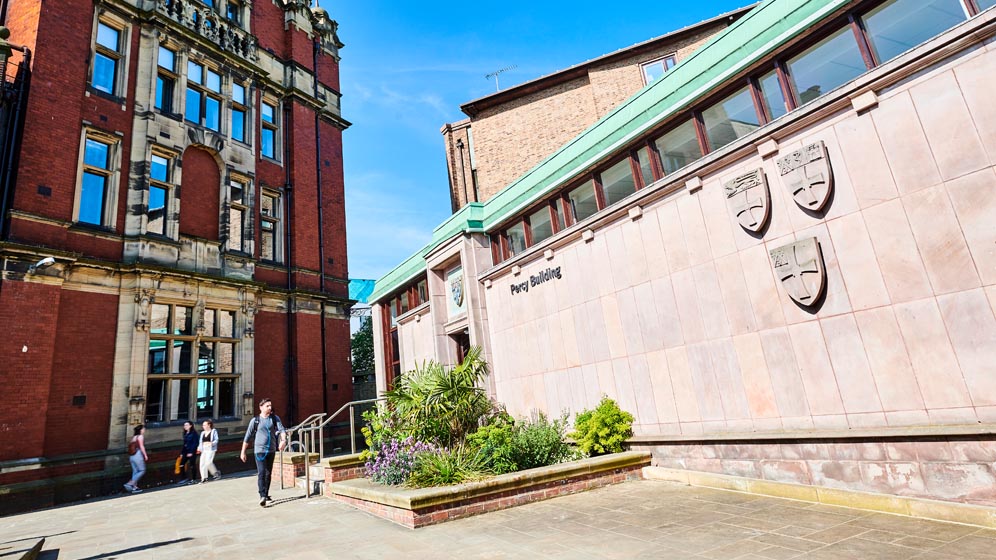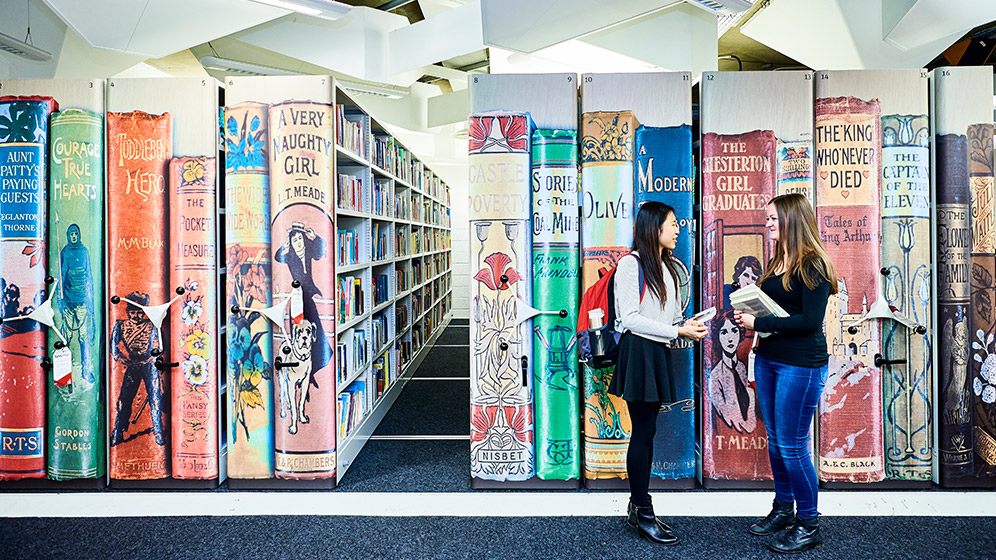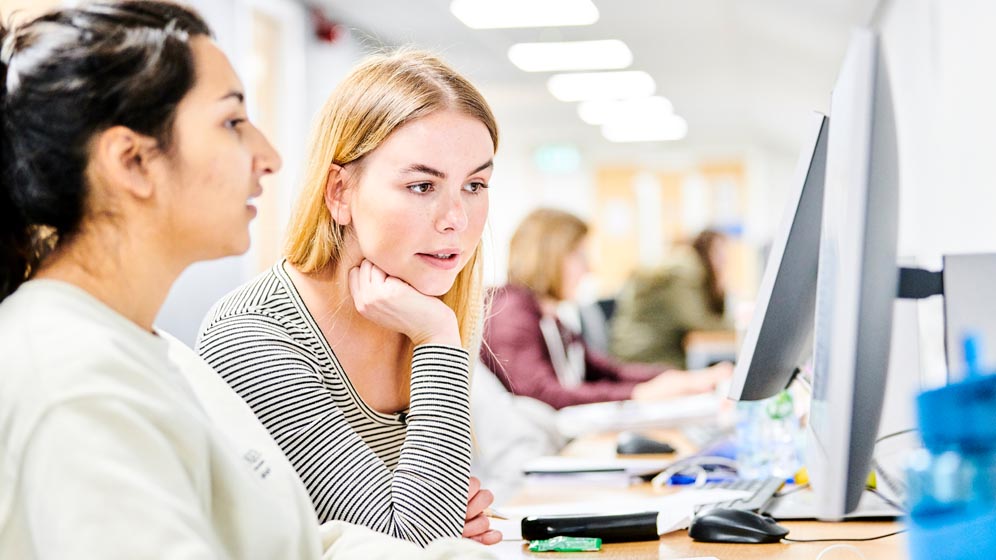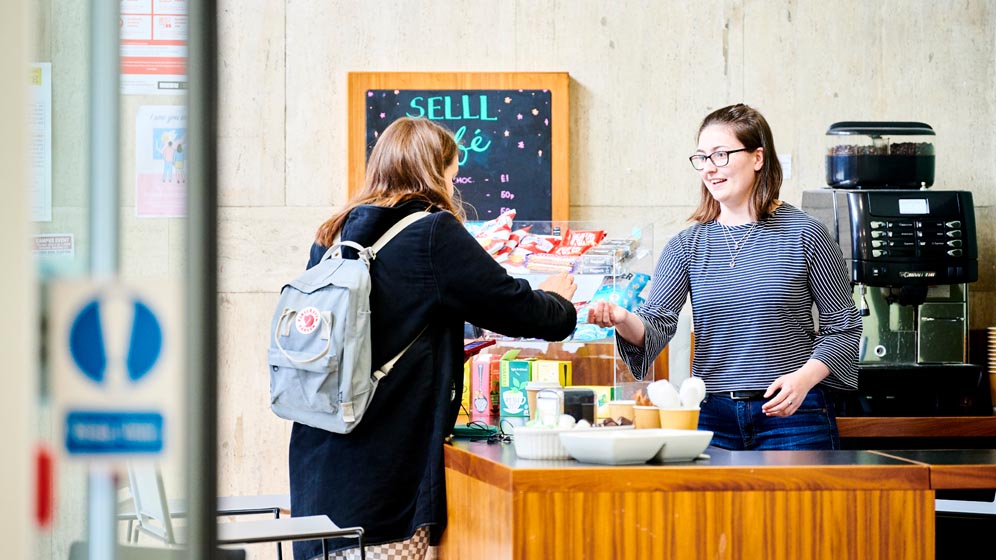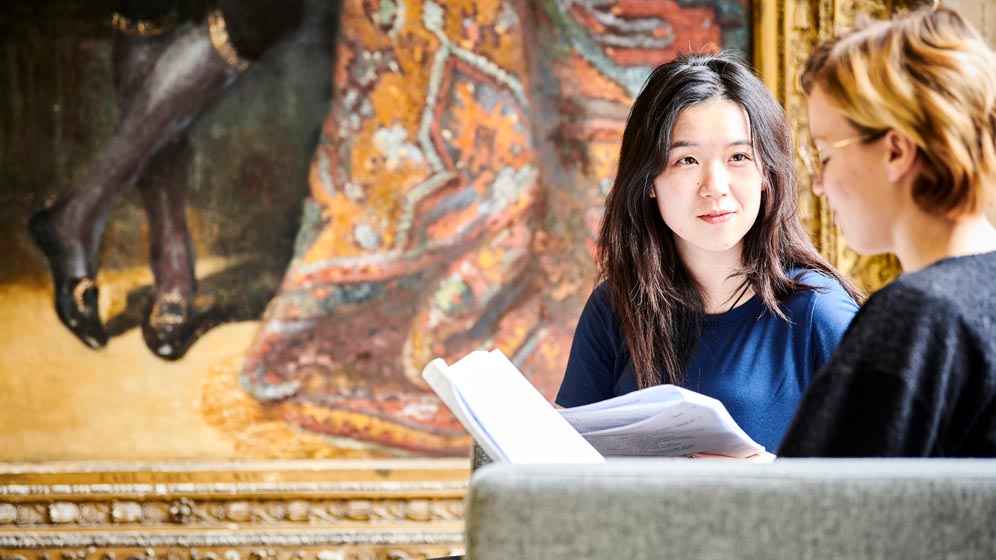English Literature BA Honours
- UCAS code: Q306
- Full time
- 3 years
Explore the cultural and political power and pleasure of literature across period and genre. From ancient epic to modern tragedy. Study with us to learn how texts shape our world.
You are currently viewing course information for entry year: 2026
Next start date:
- September 2026
UCAS Institution name and code:
- NEWC / N21
Course overview
Our English Literature BA Honours degree is an ever-evolving course. Our teaching is driven by our original, innovative research which has been formally recognised as the best in the country (Research Excellence Framework 2021).
Explore innovative approaches to literature - whether that relates to the Anglo-Saxon epic or the contemporary novel.
Plan your degree based on your interests, with the chance to branch out in new and exciting directions.
Study canonical authors such as Chaucer, Shakespeare, and Keats alongside modern writers such as Kazuo Ishiguro, Samuel Selvon, Bernardine Evaristo, and Arundhati Roy.
Investigate the literature of medieval warfare, the Gothic, or cultural movements such as Modernism. Study theatre and stagecraft and learn about performance on stage.
We have special strengths in:
- Renaissance and Romantic literature
- Gothic and Women’s writing
- Postcolonial and Contemporary literature
All complemented by expertise in American literature, and in theatre and performance.
You'll gain the practical and theoretical skills needed to analyse these works, develop well-reasoned arguments, and to communicate confidently and persuasively.
We also offer a wide range of assessment options. You'll write many essays, but will also have the option to compose creative responses, or create public-facing work, such as:
- websites
- book reviews
- op-eds
- theatre programmes
- exhibitions
Throughout, we'll invite you to think about the impact of literature on the world and your own relation to it.
Your course and study experience - disclaimers and terms and conditions
Please rest assured we make all reasonable efforts to provide you with the programmes, services and facilities described. However, it may be necessary to make changes due to significant disruption, for example in response to Covid-19.
View our Academic experience page, which gives information about your Newcastle University study experience for the academic year 2025-26.
See our terms and conditions and student complaints information, which gives details of circumstances that may lead to changes to programmes, modules or University services.
Quality and ranking
Professional accreditation and recognition
All professional accreditations are reviewed regularly by their professional body.
Modules and learning
Modules
The information below is intended to provide an example of what you will study.
Most degrees are divided into stages. Each stage lasts for one academic year, and you'll complete modules totalling 120 credits by the end of each stage.
Our teaching is informed by research. Course content may change periodically to reflect developments in the discipline, the requirements of external bodies and partners, and student feedback.
Featured module
SEL3445: Unsex'd Females: Feminism in the Age of Revolution and ReactionExamine how feminist literature and representations of gender identity and women's sexuality developed during the Revolutionary and Romantic eras and were shaped by writers’ responses to the political and cultural context of the time.

Optional module availability
Student demand for optional modules may affect availability.
Full details of the modules on offer will be published through the Programme Regulations and Specifications ahead of each academic year. This usually happens in May.
To find out more please see our terms and conditions
This year is all about expanding your skills and knowledge, while supporting you in making the transition to university study.
Our modules introduce you to the history of English Literature, looking at moments of influence, transformation, and revolution.
You'll study the texts that ushered in new forms and ideas and influenced generations of writers and thinkers globally. These range from the classical epics of Greece to the shocks of revolutionary poetry and utopian prose.
We'll help you develop your skills in interpreting poetry, plays, prose and film. You’ll learn new critical and theoretical models to support and strengthen your analysis.
You’ll also have the opportunity to broaden your knowledge through modules in other humanities disciplines, including:
- creative writing
- languages, modern or ancient history
- philosophy
- sociology
- media
- psychology
Modules
| Compulsory Modules | Credits |
|---|---|
| Transformations | 20 |
| Doing Criticism | 20 |
| Beginnings | 20 |
| Revolutions | 20 |
| Optional Modules | Credits |
|---|---|
| Introduction to Creative Writing | 20 |
| Drama, Theatre & Performance | 20 |
In your second year you'll cultivate your specialised knowledge and independent research skills.
Our modules enable in-depth study of specific literary periods. You'll take at least two pre-19th-century modules and at least two modules focusing on modern or contemporary topics.
Whether you’re studying early Medieval, Renaissance, Romantic, Victorian, Modernist, or Contemporary literature, we'll introduce you to the most recent and innovative thinking, reflecting your lecturers’ own cutting-edge research.
Your own independent research will grow out of your in-depth period studies. The independent project will teach you how to research, plan and write an essay on a topic of your choice. This will prepare you for your third-year independent work on a subject chosen from your own unique interests.
Modules
You only take one of the following modules if you undertake the Study Abroad exchange programme:
This year builds in further opportunities to pursue the topics that interest you. You'll choose at least three specialist modules, all shaped by the research expertise of your lecturers.
You'll take modules that cover both pre-19th-century and post-19th-century topics.
Current options include modules that feature:
- Gothic literature
- Renaissance drama
- Romantic poetry
- Utopian writing and science-fiction
- Global Anglophone Literature
- Country house literature
- Early feminist writing
- American literature
- Popular and genre fiction
- Literatures of the North and North East of England
In our capstone, ‘dissertation’ modules you'll complete a final-year research project either as a long essay, a digital exhibition, or as a digital edition.
This will draw on everything you have learnt during your degree, will be on a topic you are passionate about, and demonstrate your skills in researching, writing and thinking.
Modules
The Independent Essay I (English Literature) and Independent Essay II (English Literature) modules are only available in exceptional circumstances.
We base these figures and graphs on the most up-to-date information available to us. They are based on the modules chosen by our students in 2024-25.
Teaching time is made up of:
- scheduled learning and teaching activities. These are timetabled activities with a member of staff present.
- structured guided learning. These are activities developed by staff to support engagement with module learning. Students or groups of students undertake these activities without direct staff participation or supervision
Teaching and assessment
Teaching methods
You can normally expect to spend around 10 hours per week attending lectures, seminars and workshops. You'll also spend around 25 hours per week on class preparation, reading, writing, and other kinds of independent research recommended by your tutor.
Assessment methods
You'll be assessed through a combination of:
-
Assignments – written or fieldwork
-
Coursework
-
Dissertation or research project
-
Essays
-
Examinations – practical or online
-
Group work
-
Presentations
Skills and experience
Practical experience
Many of our modules offer practical experience. For literary studies, this might include:
- archival visits
- editing work such as transcribing and coding
- script-in-hand readings
- masterclasses with outside professionals
- debates
The School has a longstanding relationship with a local primary school, where our students have the opportunity to work with teachers and children on an annual creative arts or history project.
When you study English Literature at Newcastle, you'll also enjoy regular field trips organised by the School.
Depending on the module these include visits to:
- The Wordsworth Trust (Dove Cottage)
- City theatres such as Northern Stage, Live Theatre, and Theatre Royal, and the Tyneside Cinema
- Seven Stories (the National Centre for Children's Books)
- National Library of Scotland, Edinburgh
- Country Houses and Estates
Business skills
Our module assessments develop a wide range of skills. These can be applied to many different tasks you might be employed to do.
Your strong communication, writing and reasoning skills, coupled with the creativity of your degree, can be used in:
- writing reports and developing policy for public services and private companies
- journalism and public writing
- constructing marketing briefs and drafting website copy
- curating exhibitions and programming events
- teaching and training
Beyond our modules, there are plenty of extracurricular opportunities to gain work experience or develop your portfolio.
These range from writing for Newcastle’s student newspaper, to paid internships in the department, including working as a student ambassador in public-facing roles.
The Newcastle Centre for Literary Arts hires students to work on everything from event management to app design.
The Centre also runs workshops with professionals in the creative industries to support students eager to develop a writing or publishing career. We also offer work placement modules in partnership with the careers service in Stage 2 and 3.
Find out more about the Newcastle Centre for Literary Arts
Research skills
The high point of your degree is your own personal research project which you complete at Stage 3. This project can be a long essay, a digital exhibition or a digital edition.
All of these projects develop your research skills in:
- searching catalogues and databases effectively and efficiently
- finding original sources
- compiling secondary literature and key references
- researching context
- writing up your findings in an organized and cogent manner
- meeting project milestones and deadlines
The digital exhibition also introduces you to:
- writing for public-facing audiences
- using an industry-standard platform to create digital stories
- copyright law and intellectual property
- the principles of online exhibition design (via an industry masterclass)
The digital edition develops additional skills in:
- transcription
- editing
- coding
You can also apply for a paid vacation scholarship and work alongside researchers on a shared project.
You'll have first-hand experience working on a project and this will add to your existing skills by teaching you to:
- work on a research project as part of a team
- explore archival collections
Opportunities
Study abroad
You can study abroad for one semester in your second year as part of this degree. In Europe we have links with:
- Ghent University, Belgium
- Leipzig University, Germany
- Groningen University, Netherlands
- Radboud University Nijmegen, Netherlands
We also have links with universities in other parts of the world, including Australia, Brazil, Canada, Hong Kong, Singapore, South Korea and the USA, including, but not limited to:
- Monash University, Australia
- University of Sydney, Australia
- McGill University, Canada
- University of Hong Kong
- University of Vermont, USA
Find out more about Study Abroad.
Work placement
During your degree, you’ll have multiple opportunities to undertake a meaningful work placement. In your second and third years, you may choose to take the Career Development Module which offers academic credit for 50 hours of placement. You can choose to carry out your placement via part-time work, volunteering, or in a local school. You will be assessed through a mixture of written work, presentations, and professional skills assessment.
In addition, you'll have the option to spend 9 to 12 months on a work placement. You will receive University support from our dedicated Careers team to help you secure your dream placement in the UK or abroad. Work placements take place between stages 2 and 3.
You'll gain first-hand experience of working in a sector, putting your learning into practice, and developing your professional expertise. Previous placements have been in a range of sectors, including:
- journalism and broadcasting
- sustainable energy
- politics
- digital media and marketing
- education
- finance
- museum and heritage
- travel and tourism
If you choose to take a work placement, it will extend your degree by a year. Placements are subject to availability.
Facilities and environment
Facilities
You'll be based in the School of English Literature, Language and Linguistics. The School is located in the Percy Building, which is at the heart of our city-centre campus. You'll join a lively community of students, academics, writers, and professionals.
You'll have access to:
- a digital media lab – for students with documentary and film-making modules
- a PC cluster
- a student-led café
- plenty of spaces to work and socialise
You will have exceptional library provision from our award-winning Library Service. It houses over one million books and a huge range of electronic resources.
Our literature and creative writing teaching is linked to the Newcastle Centre for the Literary Arts (NCLA) programme. This will give you regular contact with leading creative artists. You'll also have access to a diverse programme of events, including spoken-word events and creative writing courses.
Find out more about the School of English Literature, Language and Linguistics.
Support
You'll have the support of an academic member of staff as a Personal Tutor throughout your degree to help with academic and personal issues affecting your academic progress.
Peer Mentors will help you in your first year. They are fellow students who can help you settle in and answer questions you may have when starting university.
Your future
Industry links
Our alumni include:
- Peter Straughan (screenwriter of Tinker, Tailor, Soldier, Spy)
- Andy Bird (former chairman of Walt Disney International)
- Neil Astley (writer and founder of Bloodaxe publishing house)
- Teresa Graham, CBE (policy maker, government advisor and advocate for women in business)
- Ruth Sunderland (Business Editor, Daily Mail)
- Pippa Crerar (Political Editor, The Guardian)
- John Yorke (former head of Channel 4 drama and former Controller of BBC Drama Production)
Sorry, you need JavaScript to view this video
Follow in their footsteps
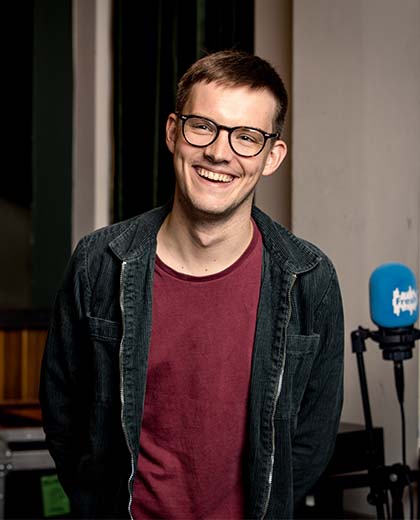
- Name: Oliver
- Nationality: British
- Graduated: 2017
- Now working as: Podcast Producer at Fresh Air
"You feel as if everyone genuinely wants to be there. It’s not just ticking boxes to get a degree at the end – everyone relishes the chance to work together and learn from one another."
Find out what Oliver liked the most about studying English Literature at Newcastle University and how this degree helped him in his career.
Careers support
Our Careers Service is one of the largest and best in the country, and we have strong links with employers. We provide an extensive range of opportunities to all students through our ncl+ initiative.
Visit our Careers Service website
Recognition of professional qualifications outside of the UK
If you’re studying an accredited degree and thinking about working in Europe after you graduate, the best place to find current information is the UK Government’s guidance on recognition of UK professional qualifications in EU member states. This official resource explains whether your profession is regulated in another country, what steps you need to take, and which organisation you should contact.
Entry requirements
All candidates are considered on an individual basis and we accept a broad range of qualifications.
The entrance requirements and offers below apply to 2026 entry.
| A-Level | |
|---|---|
| International Baccalaureate | |
|---|---|
Other UK and the Republic of Ireland qualifications
Alternative offers at Newcastle
Through one of our contextual or alternative offer routes, you could receive an offer of up to three grades lower than the typical requirements.
Contextual offers
We use certain contextual data from your UCAS form, alongside your application, to consider challenges that you may have faced in your education and the potential effect this may have had on your qualifications. This means you may be eligible to receive a lower contextual offer.
PARTNERS offers
One of the largest and longest support entry routes to university of its kind for students from underrepresented backgrounds. We support applicants from application through to study.
Realising Opportunities offers
A unique programme delivered in collaboration with 10 leading, research-intensive universities in the UK. The programme is open to students in Year 12/first year of college.
Pathways to Newcastle offers
Pathways to Newcastle, our national skills entry route, is available for specific subject areas.
High Performance Athletes
We support promising athletes at the application stage, who compete in regional, national or international levels in their sport.
Qualifications from outside the UK
English Language requirements
Entrance courses (INTO)
International Pathway courses are specialist programmes designed for international students who want to study in the UK. We provide a range of study options for international students in partnership with INTO.
These courses are specifically designed for international students who want to study in the UK and progress onto one of our undergraduate degrees. Our International Study Centre, has a range of study options including:
- International Foundation
- International Year One
- English Language courses
Find out more about International Pathway courses
Admissions policy
This policy applies to all undergraduate and postgraduate admissions at Newcastle University. It is intended to provide information about our admissions policies and procedures to applicants and potential applicants, to their advisors and family members, and to staff of the University.
University Admissions Policy and related policies and procedures
Credit transfer and Recognition of Prior Learning
Recognition of Prior Learning (RPL) can allow you to convert existing relevant university-level knowledge, skills and experience into credits towards a qualification. Find out more about the RPL policy which may apply to this course.
Tuition fees and scholarships
Tuition fees for academic year 2026-2027
The 2026 entry home fees have not yet been confirmed.
| Qualification: BA Honours | |
|---|---|
|
Home students full time 3 years |
Tuition fees (Year 1)
Not set |
|
International students full time 3 years |
Tuition fees (Year 1)
24,500 |
Year abroad and additional costs
For programmes where you can spend a year on a work placement or studying abroad, you will receive a significant fee reduction for that year.
Some of our degrees involve additional costs which are not covered by your tuition fees.
Scholarships
Find out more about:
Open days and events
You'll have a number of opportunities to meet us throughout the year at our on-campus and virtual open days.
You'll be able to:
- explore our beautiful campus
- find out about our vibrant city
- discover what students think about studying at Newcastle
You'll also have the opportunity to speak to academic staff and find out more about the subjects you're interested in.
Find out about how you can visit Newcastle in person and virtually.
We regularly travel overseas to meet with students interested in studying at Newcastle University. Visit our events calendar to find out when we're visiting your region.
How to apply
Apply through UCAS
To apply for undergraduate study at Newcastle University, you must use the online application system managed by the Universities and Colleges Admissions Service (UCAS). All UK schools and colleges, and a small number of EU and international establishments, are registered with UCAS. You will need:
- the UCAS name and institution codes for Newcastle University (NEWC/N21)
- the UCAS code for the course you want to apply for
- the UCAS 'buzzword' for your school or college
If you are applying independently, or are applying from a school or college which is not registered to manage applications, you will still use the Apply system. You will not need a buzzword.
Apply through UCASApply through an agent
International students often apply to us through an agent. Have a look at our recommended agents and get in touch with them.
Get in touch
By phone
Call us on +44 (0) 191 208 3333 and press option 1. Our opening hours are Monday to Friday 10am until 4pm.
Live chat
Our NCL chatbot might be able to give you an answer straight away. If not, it’ll direct you to someone who can help.
You'll find our NCL chatbot in the bottom right of this page.
Online
Keep updated
We regularly send email updates and extra information about the University.
Receive regular updates by email





